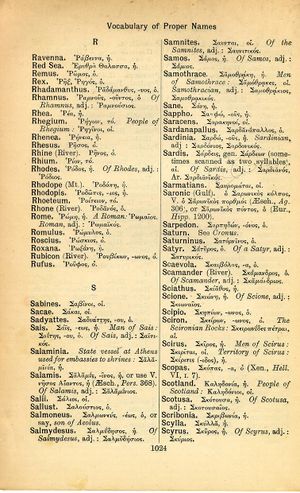Rhea
μηδ' εἰς ὀρχηστρίδος εἰσᾴττειν, ἵνα μὴ πρὸς ταῦτα κεχηνὼς μήλῳ βληθεὶς ὑπὸ πορνιδίου τῆς εὐκλείας ἀποθραυσθῇς → and not to dart into the house of a dancing-woman, lest, while gaping after these things, being struck with an apple by a wanton, you should be damaged in your reputation
English > Greek (Woodhouse)
Ῥέα, ἡ.
Latin > English (Lewis & Short)
Rhēa: ae, f.,
I an old Italian name. Thus, Rhea Silvia, daughter of Numitor and mother of Romulus and Remus, Liv. 1, 3; Flor. 1, 1, 1; Prud. adv. Symm. 1, 174 (cf. Verg. A. 1, 276).—Hence comes the name of the fabled priestess Rhea in Verg. A. 7, 659.
Rhĕa: ae, f., = Ῥέα,>
I another name for Cybele, Ov. F. 4, 201: Rhea, quae Latiis Ops, Aus. Idyll. 12 de Deis, 2.
Latin > French (Gaffiot 2016)
(1) Rhĕa,¹⁵ æ, f., Rhéa, Ops ou Cybèle [fille du Ciel et de la Terre, femme de Saturne, mère des dieux] : Ov. F. 4, 201.
(2) Rhĕa,¹⁶ æ, f., Rhéa Silvia ou Ilie, mère de Romulus et de Rémus : Liv. 1, 3, 11 ; Flor. 1, 1, 1.

